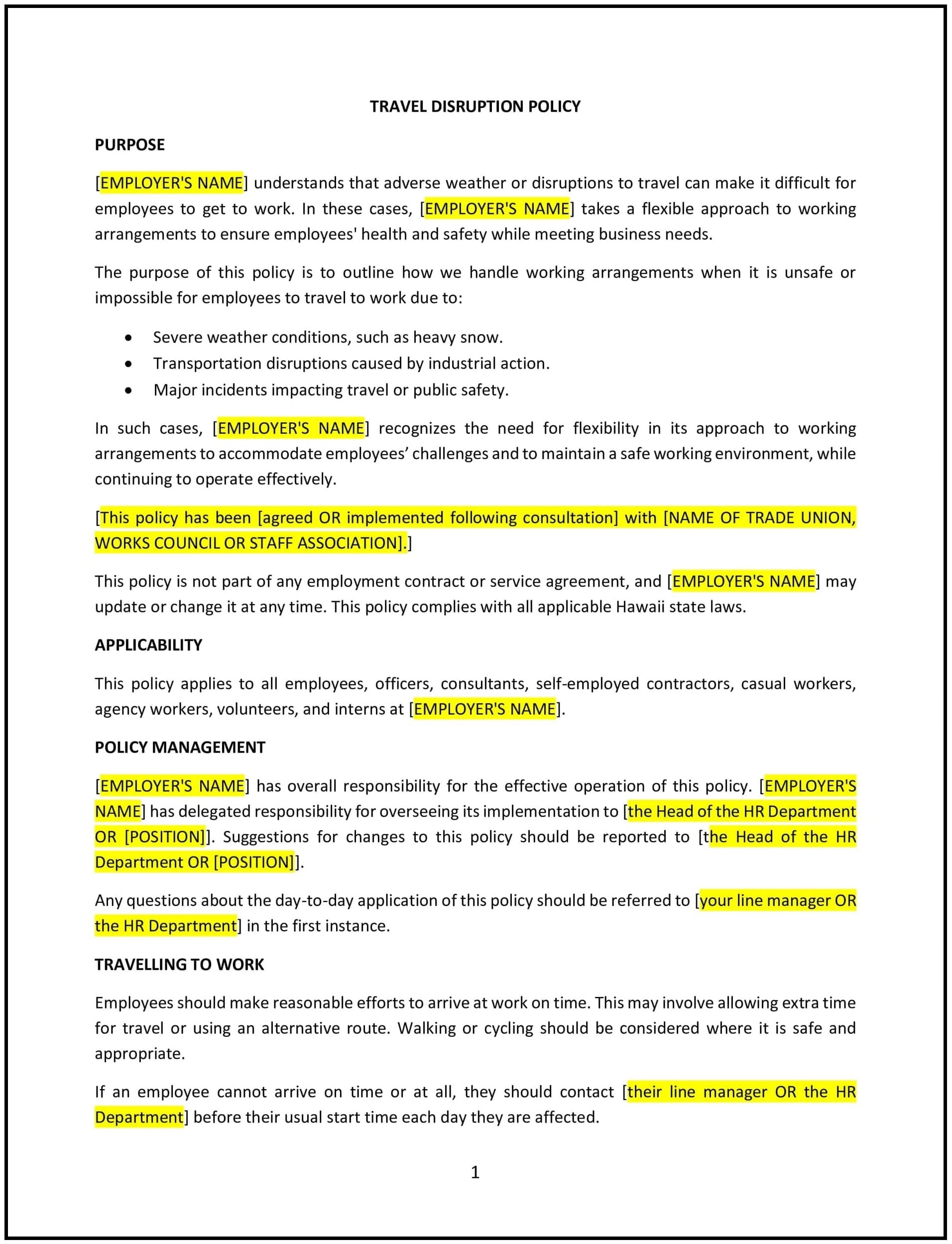Got contracts to review? While you're here for policies, let Cobrief make contract review effortless—start your free review now.

Customize this template for free
Travel disruption policy (Hawaiʻi)
A travel disruption policy helps Hawaiʻi businesses prepare for and manage unexpected events that impact employee travel, such as flight cancellations, natural disasters, or other emergencies. This policy outlines procedures for addressing disruptions, ensuring employee safety, and minimizing operational impacts. It is designed to provide clarity and support during unforeseen travel challenges, reflecting Hawaiʻi’s unique geographic and environmental considerations.
By implementing this policy, businesses in Hawaiʻi can protect employees, maintain productivity, and demonstrate a commitment to safety and preparedness.
How to use this travel disruption policy (Hawaiʻi)
- Define travel disruptions: Clearly explain what constitutes a travel disruption, such as flight delays, cancellations, severe weather, or natural disasters.
- Establish communication protocols: Outline how employees should communicate with the business during a disruption, including whom to contact and how to provide updates.
- Provide safety guidelines: Offer guidance on how employees should prioritize their safety during disruptions, such as seeking shelter or following local advisories.
- Address alternative arrangements: Describe the process for rebooking travel, finding accommodations, or making other necessary arrangements during a disruption.
- Outline reimbursement procedures: Specify which expenses related to travel disruptions are reimbursable, such as additional lodging or transportation costs.
- Plan for remote work: Provide guidelines for employees to work remotely if travel disruptions prevent them from reaching their destination.
- Communicate the policy: Share the policy with employees during onboarding and through internal communications to ensure awareness and understanding.
- Train employees and managers: Educate staff on the policy’s guidelines, including how to handle disruptions and prioritize safety.
- Monitor and update the policy: Regularly review the policy’s effectiveness and make adjustments as needed to reflect changes in travel trends or business needs.
Benefits of using this travel disruption policy (Hawaiʻi)
This policy offers several advantages for Hawaiʻi businesses:
- Protects employee safety: Clear guidelines help employees navigate disruptions safely and make informed decisions during emergencies.
- Reduces stress: A structured policy provides employees with reassurance and support during unexpected travel challenges.
- Maintains productivity: Procedures for remote work or alternative arrangements help minimize disruptions to business operations.
- Enhances preparedness: The policy ensures businesses are ready to handle travel disruptions effectively, reducing operational impacts.
- Builds trust: A proactive approach to travel disruptions demonstrates the business’s commitment to employee well-being and safety.
- Supports compliance: The policy aligns with best practices for travel safety and emergency preparedness.
- Improves efficiency: Clear procedures for handling disruptions save time and resources by reducing confusion and delays.
Tips for using this travel disruption policy (Hawaiʻi)
- Communicate the policy effectively: Share the policy with employees during onboarding and through regular reminders, such as emails or training sessions.
- Provide resources: Offer employees access to travel advisories, emergency contacts, and tools for rebooking travel or finding accommodations.
- Train employees: Educate staff on how to handle travel disruptions, prioritize safety, and follow the policy’s guidelines.
- Be flexible: Work with employees to find solutions during disruptions, such as adjusting schedules or approving additional expenses.
- Monitor disruptions: Stay informed about potential travel disruptions, such as severe weather or natural disasters, and communicate updates to employees.
- Review the policy periodically: Update the policy as needed to reflect changes in travel trends, business needs, or emergency preparedness practices.